Geektionary: Difference between revisions
(→D-E: added doujinshi) |
(→F: added fan art entry, someone please expand on this) |
||
| Line 221: | Line 221: | ||
=F= | =F= | ||
==Fan Art== | |||
Often referring to unofficial artwork by amatuer artists using existing media as the subject matter. | |||
==Fanfiction== | ==Fanfiction== | ||
Revision as of 07:16, 6 January 2009
Note: You will notice that The Geektionary occasionally uses first person references in violation of this site's standards and practices. This is the exception that tests the rule. Don't anyone else do this.
More Pages
Introduction
Like anything else, geeks have their own unique subculture, and Evangelion geeks are no exception. The aim of the Geektionary is to provide a little guide to the incomprehensible geek-culture saturating the entire commentary (the FGC community in particular). People who actually have lives are bound to ask these kinds of questions: “What the heck do all those acronyms stand for? What is this ReDeath they keep on mentioning, or Thumbnail Theatre, for that matter? And what's all that weird Japanese they keep on throwing in? I speak English, goddamit!”
Some terms, like “AMV” and “shipping”, are hardly specific to NGE geekdom, but we will explain their significance to the fandom nonetheless. For explanations of various other Internet geek memes you might see in use (like the omnipresent “n00b”), I recommend Urban Dictionary and Wikipedia.
Acronym Quick-Reference Guide
Acronyms/abbreviations/TLAs are a running joke at the ANF Evangelion forum. Terms from the show quickly become TLA (three-letter acronyms), but then, inevitably, new acronyms need to be invented for any often-referenced idea — and sometimes merely for their own sake. Many of these are self-explanatory, but those marked by asterisks will be further explained in the lexicon section.
2I: Second Impact
3I: Third Impact
AATF: Anti A.T. Field
AEL: Artificial Evolution Laboratory
AMV*: Anime Music Video
ANF*: AnimeNation Forums
ATF: A.T. Field (Absolute Terror Field)
AU*: Alternate Universe
AWL*: Amanda Winn Lee
BIB*: Big Irony Bomb
CE: Contact Experiment
CI: (NGE2) Classified Information
CP: Commentary Page
D&R: Death & Rebirth
ED*: Ending
EGK*: Evil Gekijouban Kyoko
EMF*: Eva Monkey Forums
EMK*: Evil Manga Kaworu
EoE: End of Evangelion
EoTV*: End of TV
EU*: Expanded Universe
FAR*: First Ancestral Race
FGC: (Evangelion) Fan-Geeks Commentary (Project)
FMttM: Fly Me to the Moon
FoK: Fruit of Knowledge
FoL: Fruit of Life
GGNR*: Giant Giant Naked Rei
GNK*: Giant Naked Kaworu
GNR*: Giant Naked Rei
GOS*: Girlfriend of Steel
GOS2*: Girlfriend of Steel 2
GSF*: Genetically Similar Facsimile
HCP: Human Complemention Project (see HIP)
HIP*: Human Instrumentality Project
JA: Jet Alone
JSSDF: Japanese Strategic Self-Defense Force
KFR*: Kentucky Fried Rei
LAEM*: Live Action Evangelion Movie
LCL*: Not what you might think
LnY*: Longinus no Yari
LoL*: Lance of Longinus
LTP*: Literal Translation Project
MGNR: Mini Giant Naked Rei
MP*: Mass Production (Model Evangelion)
MPB*: Metaphysical Biology
N²*: No(n) Nuclear
NGE: Neon Genesis Evangelion
NPC*: New Production Cut
OP*: Opening
P3II*: Pre-3I Instrumentality
RCB*: Red Cross Book
REGK: Really Evil Gekijouban Kyoko (see EGK)
RIAO*: Rei in Appearance Only
RNR*: Regular Naked Rei
S²*: Super Solenoid
SoL*: Source of Life
SDSS: Secret Dead Sea Scrolls
ToL: Tree of Life
UBF*: Über Bitch Fight
Lexicon: A
Addition Drama Track
To save Reichu's phalanges some effort, look here. Then, go here and download the picsub. There is little more to say.
ADV
A veritable empire in the realm of anime localization, which acquired the NGE TV series when the Texas-based company was still young and localized it for western countries*. The English dub they produced remains — as part of the bigger, perpetually futile Dubs vs. Subs debate — an apple of discord within the NGE community. Their pre-Platinum releases were not, like many domestic anime releases of that time, up to par with the expectations of today. While the horrendous picture quality was not their fault, the translations used for both the subtitles and the dub obscured, distorted, or outright erased many of NGE's finer points — thus making deeper understanding of an anime that so heavily utilizes subtlety more unobtainable than would a reliable translation. (And the dub, by the very nature of dubs, exacerbated the problem.) Other strikes against ADV include:
- The promotion of misinformation via the descriptions on the video packages and “supplemental” materials included in their releases.
- Their failure to wait for the Japanese video releases of the final TV episodes, resulting in an unnecessarily long wait for the NPC episodes. (But as an unintended “bonus”, this meant that we did get the original TV cuts of these episodes. ::p)
- The utilization of overlays in the Collection volumes.
- Their decision to release Platinum in such close proximity to the long-delayed release of the “Directors' Cut” episodes. Getting the pre-Renewal NPC episodes locally is still a boon for completists, but this bad commercial decision — “bad” as in “respectability meter down another point”, not “bad” from the cold and inhuman money-milking POV — was still a peeve for many.
- No need to go on with various other minutiae… Despite the bad timing of Platinum, ADV has largely redeemed themselves with it. See Platinum for more details.
- I'm only certain about the US, UK, and Canada. Not sure about elsewhere, or how releases lacking the ADV label were, or weren't, connected to ADV. Anyone?
Angel Tower
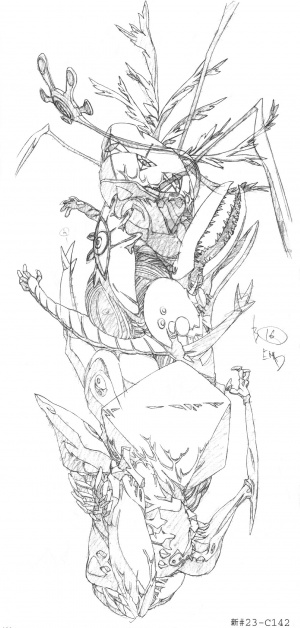
The grotesque form that bubbles out of EVA-00's back in episode #23', a conglomeration of Armisael's dead siblings, immediately after Rei's metaphysical interchange with the 16th concludes, and a matter long perplexing fans. Infrequently referenced by its Japanese equivalent, "shito no tou" 使徒の塔. Coined by Reichu.
Angelic Days
See Love Eva.
Anti-shipping
See Shipping.
AWL
Amanda Winn Lee, the dub voice of Rei and ADR director for the English adaptation of the two movies (and unofficially for parts of the TV series). She has earned a harsh reputation among most of us geeks for a number of reasons — most highlighted by her Commentary of Evil. This acronym is particularly useful because, as tv33 put it, “Her true name is too evil to be typed in full.”
AU
Alternate Universe. This acronym is certainly nothing new, but in NGE fandom it specifically refers to the infamous sequence from episode #26, wherein we get a frightening glimpse of what NGE might have been like were it a teenage school romance/comedy… without Evas or Nerv, and with a Rei who is Rei in appearance only. A lot of people seem to think that this sequence is the pinnacle of the series, but Reichu thinks that said people are all missing the point. This particular AU was elaborated upon in the video game Girlfriend of Steel 2, but… well, look here.
- The live action sequence that was cut from EoE could also be considered AU.
B-C
BIB
Big Irony Bomb. I.e., this.
Bridge Bunnies
The operators of the command center in general, but more specifically Maya, Aoba, and Hyuga. No one seems to remember where the term originated.
Commentary of Evil
A term, popularized by Dr. Nick, that refers to the notorious commentary track spanning Manga Entertainment's two NGE releases (Death & Rebirth and End of Evangelion), featuring the ever-insightful Amanda Winn Lee, Jason C. Lee (her husband and dub voice of Aoba), and Taliesin Jaffe (who does… something or other). While the track has some comedic merit, it is good for little else, packed head-to-toe with misinformation and shameless endorsement of the movies' dub (which even NGE dubbies tend to agree is a disappointment!) and the oftentimes horrifying decisions she made producing it (including this one). Jaffe gets a break because he at least attempted to present some worthwhile material, even if he wasn't 100% on track either (“Samhel”?). For something meant to accompany a very complicated and serious work of art, their commentary is offensively inadequate. Adding insult to injury, of course, is the fact that many of the poor n00bs who listen to it will, not knowing any better, parrot the commentary's BS until set straight by more wisened geeks.
D-E
Doujinshi
Often shortened to Doujin (同人), are self published japanese works such as artbooks, manga, or novels. Doujinshi are often created by amatuers and on some occasions professionals self-publish works as side projects. Many doujinshi artists work in groups called circles and many sell their works at a bi-annual event in Tokyo called Comiket. Many doujinshi works are spin-offs or parodies of existing official anime and manga, and are often adult oriented (pornographic).
ED
Ending. I.e., the ending sequence of an anime (you know, the one that has credits and stuff). Genuine anime industry shorthand, BTW.
EGK
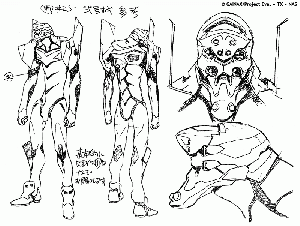
Evil Gekijouban* Kyoko(-sama). EGK — which probably resembles a gagging noise on purpose — is the EVA-02 who resulted from a most unfair design overhaul that was somehow deemed necessary for EoE. At best, gekijouban EVA-02 has a slightly modified head design, shrunken pylons, a slight slouch, and the body proportions of a harpy. At worst, the animator of a large number of cuts for the UBF turned her into this: :screams in horror:
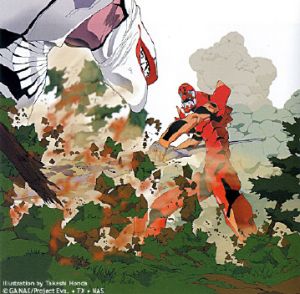
The latter is so completely abominable, it merits a new acronym: REGK (REALLY Evil Gekijouban Kyoko). What's really strange is that Takeshi Honda did the cited illustration of REGK, along with an illo for the Reprise of Evangelion CD where EVA-02 has the same frelled-up head design. Is he the one responsible for those dodgily-drawn cuts in #25′?!?
- For those not in the know, gekijouban means “theatrical edition” and is generally used in reference to, well, a theatrical adaptation of something that wasn't theatrical to start with — sort of like saying “<title>: The Movie” or “<title>: The Motion Picture”. With regards to NGE, it refers to both D&R and EoE — but, here, we specifically mean EoE, since it's, you know, the NGE movie.
EMK

Evil Manga Kaworu. Sadamoto's Kaworu is a stalker who kills kittens, and the gentle, elegant Kaworu of the anime isn't; ergo, the manga Kaworu is Evil. Well, it's a popular fan sentiment, anyway (and requires an acronym for easy reference, which was provided by Magami No ER). The "kitten-killing" part inevitably inspired some unknown individual to weave a spin-off on a certain infamous meme involving kittens, Domo-kun, and God, which is: "Every time you masturbate, Kaworu kills a kitten". Although some continue to extract endless entertainment from Kaworu's autosex-inspired felinocide, others wish it would just go away. However, Evil Manga Kaworu has reportedly said, "This meme is destined to live forever, even though it may result in the destruction of the human race." While this comment seems contradictory at first -- as the continued existence of the joke results in the death of kittens and not humans -- there is perhaps some truth to it.
EoTV
End of TV. Specifically, this refers to episodes #25 and #26 as the counterpart of EoE episodes #25′ and #26′. An exceptionally useful acronym.
EU
Expanded Universe. This idea is quite familiar to the geek: The universe of a franchise is “fleshed out” with apocryphal media (books, video games, collectible card games, etc.) that satisfies the fans' collective lust for MORE!!!, while having the nice bonus of putting lots of dough into the pockets of a select few. NGE is no exception, of course, and its EU includes such wondrous [/sarcasm] things as the original Sega Saturn, Second Impression, and Girlfriend of Steel video/computer games and the Evangelion RPG. These items aren't canonical by any means, but they provide new characters like Mana Kirishima and Mayumi Yamagishi (i.e., alternate side dishes for fapboys), various new Angels, and kickass mecha like the Toyota T-RIDEN-T Land Cruiser.
"Every time you masturbate, Kaworu kills a kitten."
See EMK.
F
Fan Art
Often referring to unofficial artwork by amatuer artists using existing media as the subject matter.
Fanfiction
See Fan-Geek.
Also see Evangelion section on FFN
Evangelion ficdom is notorious for its high opinion of itself. It exhalts it's awesomeness and superiority over all other lowly forms of fanfiction like Naruto, or DragonBall Z, or even the Harry Potter section. While this may once have been true, one look at the above link will quickly prove that this is nothing but bollocks. It also maintains the unique ability to take itself insanely seriously... to the point where people forget it's supposed to be one huge laugh.
Evangelion fanfiction comes in several flavours:
- WAFF:
- Everyone lives happily ever after. Regardless of established characterisation, universe rules or plain good taste. Usually involves Pairings...which are even worse.
- Darkfic:
- See above... only everybody dies in the end. Horribly. Including Pen-Pen. Usually used by authors to beat out their frustrations from their own lives on harmless fictional characters.
- Post Third Impact:
- For those for whom the end just wasn't good enough. Usually either a WAFF or a Darkfic. Usually lacks the depth of the original series.
- Lemons
- Tongues, Toys and Tentacles.... Avoid at all costs unless you want to know what Asuka felt like beneath Araels spotlight of doom.
- Self Insert:
- For those for whom real life just isn't good enough. The lowest of the low. Those who hate themselves so much, they adopt their own idealised persona, bed everything with a pulse in the ::universe, and frack things up faster than the JSSDF on Impact-Day. Not to mention the fact that a good deal of them seem to be better suited to fictionmania...
Fan-Geek
See Geek.
Fan Service
Fan Service is when the production team of a series inserts material that does nothing to move the plot along but just exists to give the fans a thrill.
When they hear the term "fan service", most people tend to think of sex and nudity: a typical example of such ecchi fan service in NGE would include Misato leaning forward at the dinner table in Episode 02, giving Shinji, and the audience, a good look at her cleavage, and the subsequent shot of her backside in tight shorts. However, it is important to note that not all nudity is considered fan service. Rei's nudity in Episode 05 and Asuka's exposing her breasts to Kaji in Episode 22' give the audience important information about their characters, and should thus probably not be considered gratuitous. The term fan service is also used to describe various other things including gratuitous action and explosions. Misato's Alpine A310, references to old science fiction movies and even the cans of Yebichu beer classify as "fan service".

Gainax is semi-notorious for the adding the "Gainax bounce" (first introduced in the Daicon IV opening animation) into anime series they have created, in which female characters' boobs will jiggle to an unusually large degree when they move.
While bounce-wise Evangelion is rather restrained for a Gainax series (especially in comparison to some of the studio's later works like He Is My Master), there are still plenty of suggestive scenes to go around, and in early episodes Misato actually previews next week's upcoming episode by promising "...and more fan service!" Promises of fan service have become a minor Gainax tradition and they've been recycled in episode previews in Mahoromatic and Magical Shopping Arcade Abenobashi.
You might also want to read Reichu's essay-post in the forums on excessive sexual objectification in NGE merchandise (another topic that invariably leads to naked Evas).
Fuzzy Logic
This pun on the algebraic term is an endearing reference to our old friend Fuzzy Chickens (see Troll), whose thought processes were oftentimes frustratingly — and famously — unfathomable: in other words, “fuzzy” (definition 4). An example of "Fuzzy Logic": Fuzzy claimed to disbelieve that Rei had Lilith's soul. When it was pointed out to him that Kaworu said to Rei, "We have both taken the Lilim's form on this planet," Fuzzy replied, "So what? So has everyone else."!!! Fuzzy also once opined that the "real reason" that Rei slaps Shinji in Episode 05 is because she was being deliberately sexually provocative in the infamous "glasses" scene and had been doing a slow burn all during their trip to HQ because he didn't do her on the spot.
G
Geek
Here this term is used in an entirely neutral way, implying no more than (to borrow from Wikipedia) "a person with a devotion to something in a way that places him or her outside the mainstream. This could be due to the intensity, depth, or subject of their interest." A "fan-geek" is simply a gender neutral variation upon "fanboy" or "fangirl" -- but, again, has only neutral connotations at FGC.
Gender
This entry is kinda long, so I'm giving it its own page. (Warning: Said page is, like some other things on a this site, a rather out-dated relic which will be replaced with much better things soon enough.)
GNK
Giant Naked Kaworu. The counterpart of Giant Naked Rei: the gargantuan, nude, and sexually androgynous Kaworu that briefly appears in EoE to calm poor Shinji's overtaxed senses (and do other mysterious things). While this acronym seems blindingly obvious in retrospect, HeWhoPostsStuff was the first one to put it to use.
GNR
Giant Naked Rei. One of the most beloved acronyms, and also one of the most useful. This refers to the giant Rei from End of Evangelion, produced by the conglomeration of Rei 3, Adam, and Lilith (eventually sucking up the Tree of Life -- EVA-01 and the Spear of Longinus -- for good measure). Sadly, no one knows where this acronym originally came from.
GOS
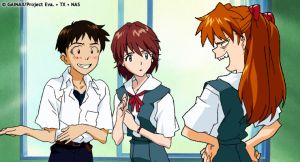
Girlfriend of Steel* (from Koutetsu no Girlfriend 鋼鉄のガールフレンド). An EU side story/dating sim released for the Sega Saturn and PC back in 1998, placed at around the end of the Action Arc (after #13, perhaps?). It is lent some “authenticity” by the fact that actual anime staff did work on it: Sadamoto and Yamashita contributed new character and mecha designs, the seiyuu reprised their character roles, it was illustrated by animators from the show, and so on. However, “playing” it is akin to sitting through a couple-hour-long fan-fiction presented in Flash format — albeit a Flash with almost no actual animation to speak of, the game instead resorting to cut-out characters moving around (think motion tweens) on painted backgrounds, if they move at all. Likewise, there is virtually no interactivity at all, but, apparently, sitting through these “A/V novels” is par for the course among Japanese gamers.
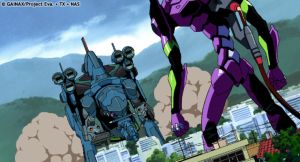
Suffering through GOS should be considered a rite of passage for NGE geeks, so I'll keep the synopsis short and spoiler-free. Essentially, GOS revolves around a new character named Mana Kirishima (who continues the NGE tradition and has a surname taken from a WW2 naval vessel), who shows up as a transfer student in Class 2-A. She's a nauseatingly cute, genki schoolgirl (voiced by Megumi Hayashibara) who immediately begins hitting on Shinji — since, you know, Shinji is 100% babe magnet and all. But, oh, what a dark secret she holds! Could it possibly have anything to do with that giant robot (the T-RIDEN-T Land Cruiser) that's prowling around Tokyo-3 at night? Or that hospitalized kid who drove his mecha off a waterfall? Or the really weird way Shinji's superiors at Nerv are acting? This couldn't be some kind of conspiracy, could it?!? Further questions abound! Will Asuka succeed in keeping her Baka-Shinji away from that Mana tramp? More importantly, will Rei actually get more than three lines of dialogue?? Get ahold of the fan-translated PC version if you just have to know!
The game has also spawned a beefed-up PS2 version released in March 2006, with the complimentary titles "Girlfriend of Steel Special Edition" (Koutetsu no Girlfriend Tokubetsuhen) and "Iron Maiden: Jesu, Joy of Man's Desiring". Apparently it has new scenarios, voices, animations, and even a new mecha designed by Yamashita-san (thanks for the tidbits, AA), but not much else is known right now.
- The official English title is actually “Iron Maiden”, but very few Westerners actually call it that, presumably because of the band by the same name. Shame — considering what an “Iron Maiden” is, the title is all-too-appropriate… (The title of a certain Iron Maiden song is also strangely applicable.)
*GOS2
Girlfriend of Steel 2 (as it is called among Westerners, even though the official English title is Iron Maiden 2nd). A sequel to GOS in spirit only: The only things this game really has in common with its predecessor are the dating sim premise (with much more dating this time around) and the basic gameplay engine. To avoid unnecessary work on my part, just check out my Walkthrough, which has a Q'n'A section at the beginning.
See also Love Eva.
-gouki
-号機 The Japanese way of saying “Unit # <so and so>”, usually in reference to pieces of machinery and other artificial constructs (like the Pokémon Porygon). This suffix is used in conjunction with the Evas' individual designations in spoken Japanese: So, even though a certain purple-clad Evangelion might have “EVA 01” written in big green letters on her arms and be referred to as “EVA-01” on computer monitors throughout the show, everyone speaking Japanese will instead call her “Shogouki” (with the sho meaning “first” and not “one”, for some incomprehensible reason; it's a -gouki tradition not limited to NGE). Of course, ADV/Manga's localizations do NOT use the “EVA-##” setup presented as the English equivalent for “-gouki” and instead just do a literal translation, resulting in “Unit” this and “Unit” that.
Due to some strange personality quirk, I hate to see Evas being called “units”. (It's probably Butt-head's fault.) Then… in translation, the tradition of substituting “#-gouki” with “EVA-##” poses certain problems when the “#-gouki” is preceded by “Eva” or “Evangelion”. In those instances, you will see in the FGC scripts that I do, in fact, resort to that horrible “U” word after all. Thus, “Eva Shogouki” becomes "Eva Unit 01".
To the point, despite the fact that Shogouki, Nigouki, etc., are terms that essentially treat the Evas like pieces like machinery, I got into the habit of using them on forums because (A) they sound cool when pronounced correctly (hint: ou is a long “o”, like in … grope), and (B) having them as alternatives to the usual monikers spices up NGE conversation. As with many things, this habit eventually began to catch on, and -gouki mysteriously started showing up in other people's posts… Anyway, here's the run-down so you can use these appellations yourself.
| Japanese (kanji) | Japanese (romaji) | English Equivalent |
|---|---|---|
| 零号機 | Zerogouki | EVA-00 (Unit 00) |
| 初号機 | Shogouki | EVA-01 (Unit 01) |
| 弐号機 | Nigouki | EVA-02 (Unit 02) |
| 3号機 (or 参号機) | Sangouki | EVA-03 (Unit 03) |
| 4号機 | Yongouki | EVA-04 (Unit 04) |
| 5号機 (or 伍号機)、6号機、7号機、8号機、9号機、10号機、11号機、12号機、13号機 | Gogouki, Rokugouki, Nanagouki, Hachigouki, Kyuugouki, Juugouki, Juuichigouki, Juunigouki, Juusangouki | EVA-05, etc. (Unit 05, etc.) |
Ultimately, these monikers are okay, because one can simply change the kanji and turn them into names without any mechanical connotations whatsoever! Take -gouki for example… If you form it with the kanji 強鬼, it means “strong oni”! (Or something like that. It's apparently a real kanji compound.) </lame justifier>
Greenfield, Matt
The president of the ADV Empire, husband of Tiffany Grant (VA of dub-Asuka), and a figure of some notoriety amongst many NGE geeks — primarily owing to his tendency to talk pretentiously about aspects of the show he knows very little about.
GSF
Archaic. Genetically Similar Facsimile. Created by tv33 as a replacement for the term “clone” in reference to the relationship between the Evas and Adam, due to my consistent bitching about how the Evas cannot be “clones” of anything considering the physical variation they exhibit amongst themselves. GSF ends up being an oxymoron, though, since ”facsimile” is essentially synonymous with “clone” — which sorta defeats the ”genetically similar [but not quite the same]” part.
Entries penned (or simply assembled) by Reichu unless otherwise noted. Harsh statements about certain individuals are only expressions of geeky displeasure with their NGE-related flubs, not assaults on their actual persons. There's an important distinction.
